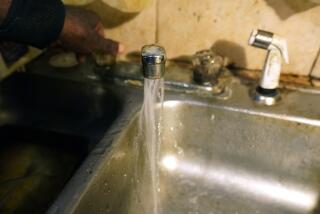Moscow Suffers Cholera Outbreak Along With Heat : Russia: Residents swim in contaminated river despite warnings. Locally contracted epidemics have been rare.
- Share via
MOSCOW — Deadly cholera has arrived in Moscow during a blistering heat wave, but sweaty citizens Monday ignored warnings not to swim in a contaminated area of the Moscow River.
“We’ll probably go swimming anyway,” said Olga Gritsenko, 19, who was celebrating Russia’s third Independence Day by picnicking with friends on the shady banks of the fouled river. She was undeterred when told that on Friday health officials discovered the bacteria, or vibrio, that causes cholera in water near their picnic site in the Kapotnya neighborhood, on the southeastern outskirts of Moscow.
“We’re afraid, but what can we do?” Gritsenko said. “The water is dirty everywhere.”
Two Muscovites were hospitalized last week with the highly infectious disease. Although the cases appear unrelated, officials said both victims contracted cholera in the Russian capital--a new, ominous development for a crowded city that has suffered an alarming increase in infectious diseases in recent years.
Last summer, 20 cholera cases were registered in Moscow, but all the patients apparently contracted the disease elsewhere, including six Russians who picked up the waterborne disease on a shopping trip to India.
“In the last several decades, Moscow has never had an epidemic of cholera that was contracted locally,” said Dr. Larisa Y. Kachanovskaya of the Moscow Sanitation Inspectorate’s department of especially dangerous diseases. “Now, for the first time this century, there exists a danger of such an epidemic.
“Unfortunately, the weather is against us,” she said Monday. “It’s hot, and it’s going to stay hot for some time. It’s very difficult to keep people from going into the water, even though we’ve announced on TV that it’s contaminated.”
Kapotnya would be considered a scenic picnic site only in Moscow, where there are few unspoiled lakes and rivers within driving distance and where recreation is becoming impossibly expensive for ordinary workers without private dachas, subsidized vacations or powerful connections to get them into restricted VIP resorts.
The neighborhood of cement-block high-rises is sandwiched between a power plant and an oil refinery. With the mercury hitting 86 degrees Fahrenheit on Monday, Vladimir and Tatiana Syomkin turned their backs on the industrial grime and looked instead across the Moscow River to an old church whose gold onion domes winked in the shimmering afternoon heat.
“At least the view is nice here,” said Tatiana Syomkin, who is expecting a baby any day now and cannot manage the long hike that leads down to the Moscow River and a cleaner and quieter spot.
Nearby, swimmers and fishermen ignored a red-painted sign that said “Danger Zone. Swimming Prohibited” to plunge into the warm water that rushed out of a reed-choked stream leading from the power plant.
The sign has been up for years because the water from the plant is highly alkaline, local residents said.
They said this is a favorite swimming spot because the plant’s waste water keeps the river temperature pleasant.
Kachanovskaya said epidemiologists found cholera vibrios in the river near Kapotnya in 1990, but it was never discovered again, despite repeated testing. Nor was it clear whether the vibrio found last week was living and breeding in the river or had washed downstream from central Moscow to Kapotnya together with the rest of the city’s waste.
“We are taking samples all the time, and in a couple of days it will be clear how bad the situation is,” she said.
The two hospitalized patients are improving and are expected to recover soon, she said.
Last summer, a cholera epidemic raged through southern Russia and Ukraine, killing 34 people and hospitalizing 2,000.
More to Read
Sign up for Essential California
The most important California stories and recommendations in your inbox every morning.
You may occasionally receive promotional content from the Los Angeles Times.













